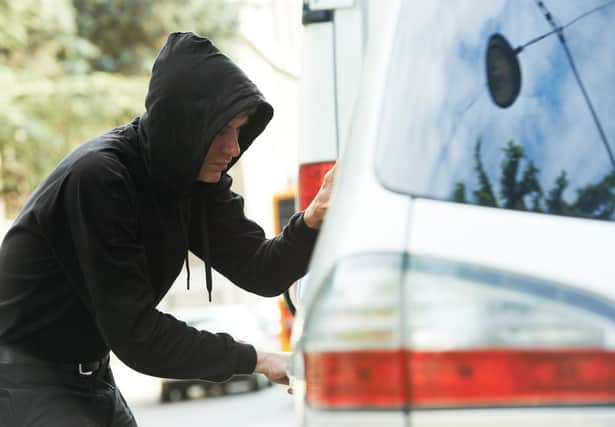Vehicle thefts jump more than 50 per cent - these are the regions where you're most at risk


Thefts of vehicles in Britain have soared by more than 50 per cent in the last four years, according to police data.
More than 150,000 vehicles were stolen in 2018-19, that is 10,000 more than the year before and nearly 55,000 (56 per cent) more than four years earlier, according to data analysed by RAC Insurance.
Advertisement
Hide AdAdvertisement
Hide AdWhile the nationwide figures for England, Scotland and Wales rose 56 per cent, the data revealed some significant differences, with some police forces reporting a more than doubling of thefts between 2014-15 and 2018-19.
Of the 42 forces which responded to RAC Insurance’s Freedom of Information request, six saw a more than 100 per cent rise in thefts. The biggest jumps were in in Suffolk (up 172 per cent from 347 to 945 thefts), Surrey (up 133 per cent from 661 to 1,543 thefts) and the West Midlands (up 121 per cent from 4,695 to 10,372).
The biggest increase in terms of the number of vehicles stolen was seen in Kent, where 40,726 vehicles were taken in 2018-19, up 45 per cent from 28,176 in 2014-15.
Only three forces - Lincolnshire, the City of London and Police Scotland - reported a reduction in thefts over the same period - down 38, 28 and nine per cent respectively.
Advertisement
Hide AdAdvertisement
Hide AdRAC Insurance spokesperson Simon Williams said: “These figures paint a rather disturbing picture – vehicle thefts are on the rise almost everywhere, and in some parts of the country numbers are rocketing. It’s also not the case that the rises in crime are confined to a few larger urban areas, with many police forces covering more rural areas also seeing big increases.
“One crumb of comfort from the data however is that the increases might be starting to plateau.”
Loading....
Mr Williams added: “Some of the increases in recent years can be put down to a rise in thefts of vehicles that are easier to steal, such as motorbikes and mopeds that are less likely to have immobilisers. Government data also shows that thieves generally use keys to access vehicles in around half of crimes, and in an estimated fifth of cases thieves were able to access cars because one or more cars weren’t locked in the first place.
“Based on these figures, it’s vital drivers take steps to protect themselves and avoid being an easy target. Three of the biggest factors that determine whether a car is stolen or not come down to how it’s secured, where it’s kept and the time of day.”
RAC Insurance tips to protect your vehicle
- Don’t make your car an easy target. Always lock your car securely when you leave it, even for a short time. Ensure all doors, windows and any roof opening (sunroof or hood) are locked, and keep your keys with you. Consider buying a steering wheel lock for extra (visible) security. This can make it easier for a would-be thief to pass over your vehicle. It’s also a good idea to keep the car’s logbook secure at home, rather than in the car
- Find the right place to park. Most vehicle-related theft takes place at night. When away from home, park in locations that are well-lit and open to public view – car parks that have security patrols and are covered by CCTV can be safer, and it’s also a good idea to look for the ParkMark logo at car parks that have met that certain security standards
- Double-check your car is locked when you leave it. Make sure you see and hear your car locking before you leave it – look for the tell-tale flashing indicators and click of the locks engaging
- Does your car use a keyless entry/start fob? Avoid being a ‘relay attack’ victim. Thieves can use a technique to copy the key signal to another device that’s placed close to a vehicle. This can fool the car into thinking the genuine key is present and can mean a thief can drive away in the car. If you have a keyless car fob, always keep it well away from doors and windows in your house. Keeping it in a metal (Faraday) box or signal blocking wallet can stop thieves copying the signal
- Consider security when you next change your vehicle. If you are buying a car on the second-hand market make sure it has an immobiliser and, ideally, a Thatcham-certified alarm. You can also use Thatcham Research’s Consumer Security Ratings to help work out how secure certain models are
- In winter: Icy morning? Don’t leave your car while it’s defrosting. The majority of vehicle thefts take place at vehicle owner’s home. Always stay in your vehicle while the car is warming up and demisting the windscreen – if you leave it, there’s a risk someone could get behind the wheel before you do